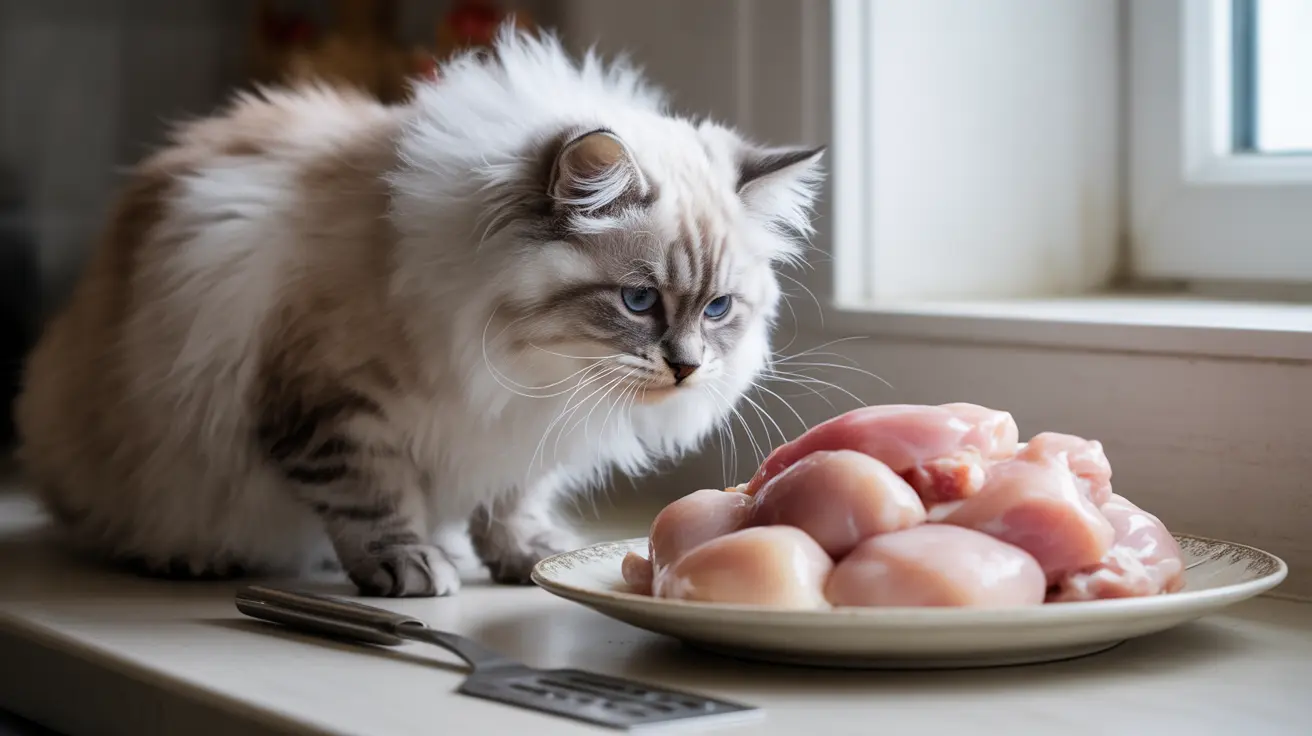As more pet owners explore natural feeding options, the question of whether cats can eat raw chicken has become increasingly common. While cats are natural carnivores, feeding them raw chicken isn't as straightforward as it might seem. This comprehensive guide examines the safety considerations, potential benefits, and risks associated with feeding raw chicken to cats.
Understanding Cats' Natural Diet
Cats are obligate carnivores, meaning they naturally require meat-based proteins to thrive. In the wild, cats hunt and consume raw prey, which might lead some pet owners to assume raw chicken is an ideal food choice. However, domestic cats have different dietary needs and safety considerations compared to their wild counterparts.
The Risks of Feeding Raw Chicken to Cats
Bacterial Contamination
Raw chicken often harbors dangerous bacteria like Salmonella, E. coli, and Listeria. While cats have more acidic stomachs than humans, they're not immune to these pathogens. Even if your cat doesn't show symptoms, they can become carriers and spread bacteria throughout your home.
Nutritional Concerns
Raw chicken alone doesn't provide the complete nutrition cats need. Essential nutrients like taurine, calcium, and various vitamins are missing from plain chicken meat. Without these vital nutrients, cats can develop serious health issues over time.
Safe Alternatives to Raw Chicken
Cooked Chicken Options
Properly cooked, plain chicken offers similar nutritional benefits without the bacterial risks. Always ensure it's thoroughly cooked and free from seasonings, bones, and skin.
Commercial Cat Food
High-quality commercial cat foods are specifically formulated to meet all your cat's nutritional needs while maintaining strict safety standards.
When Raw Chicken Might Be Appropriate
If you're determined to feed raw chicken, consider these essential guidelines:
- Always source from reputable suppliers
- Practice strict food safety protocols
- Consult with your veterinarian first
- Consider commercially prepared raw diets instead of home-prepared options
- Never feed raw chicken to kittens, elderly cats, or those with compromised immune systems
Proper Handling and Storage
If you choose to feed raw chicken, proper handling is crucial:
- Keep raw chicken refrigerated until use
- Use separate cutting boards and utensils
- Clean all surfaces thoroughly after preparation
- Never leave raw chicken out at room temperature
- Wash hands thoroughly before and after handling
Frequently Asked Questions
Is it safe to feed my cat raw chicken and what risks should I be aware of?
While cats can technically eat raw chicken, it poses significant risks including bacterial infections from Salmonella and E. coli. The safety concerns generally outweigh potential benefits, making it a risky choice for most cat owners.
Can feeding raw chicken cause nutritional deficiencies in cats?
Yes, feeding only raw chicken can lead to nutritional deficiencies. Cats need a balanced diet including taurine, vitamins, and minerals that aren't adequately present in plain chicken meat.
What parts of raw chicken are safe or unsafe for cats to eat?
Never feed cats chicken bones (raw or cooked) as they can splinter and cause internal injuries. Chicken skin and fat should also be avoided. If feeding raw chicken, use only lean meat portions.
How can I reduce the risk of bacterial infections when giving my cat raw chicken?
Practice strict hygiene, source from reputable suppliers, maintain proper storage temperatures, and clean all surfaces thoroughly. Consider commercial raw diets that undergo pathogen-reduction treatments.
Should raw chicken be fed daily, or how often can cats eat it safely?
Raw chicken shouldn't be fed daily due to bacterial and nutritional concerns. If including raw chicken in your cat's diet, it should only be part of a balanced, veterinarian-approved feeding plan.
Conclusion
While cats can eat raw chicken, the risks generally outweigh the benefits for most pet owners. Consider safer alternatives like properly cooked chicken or high-quality commercial cat foods. If you're interested in raw feeding, consult with your veterinarian and consider commercially prepared raw diets that ensure both safety and nutritional balance.






